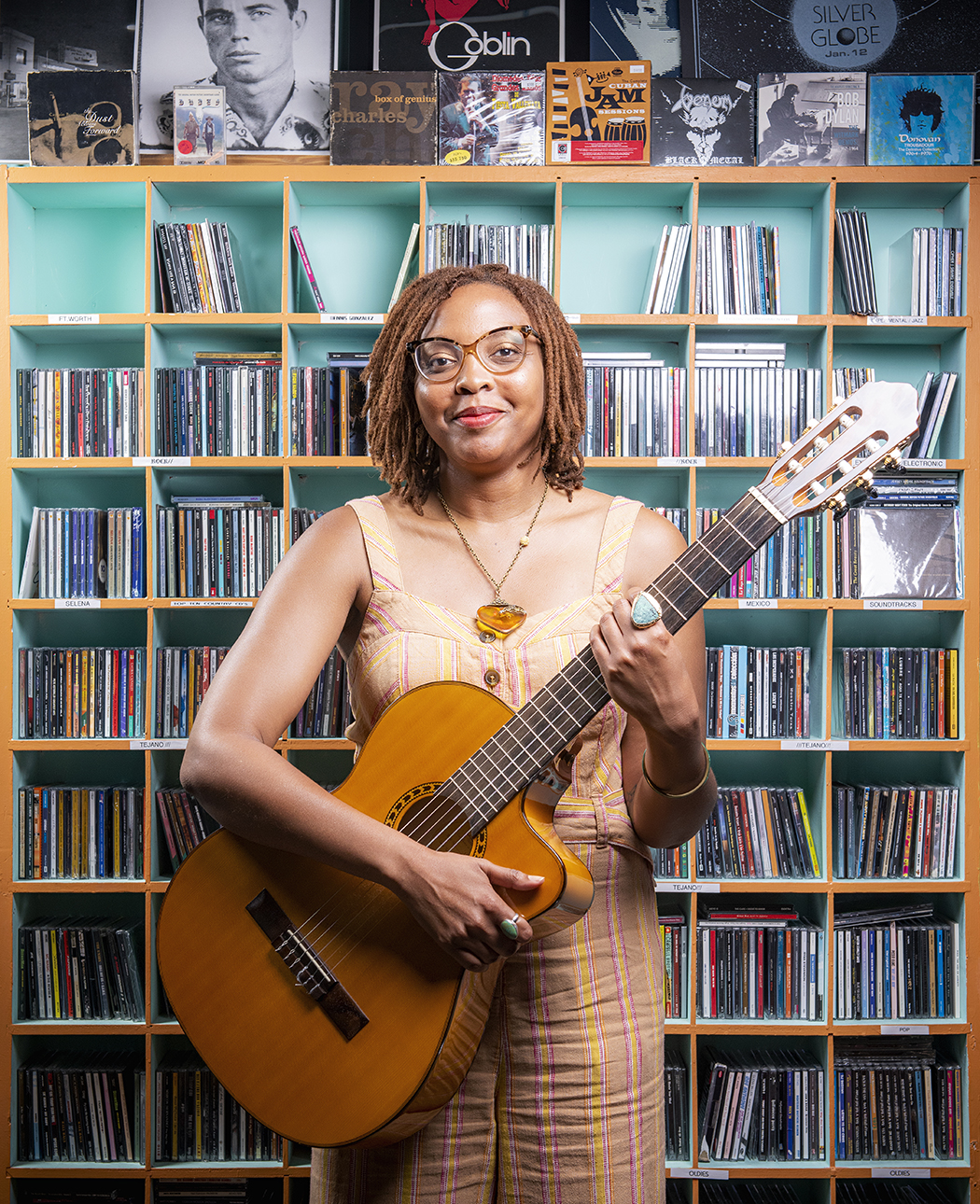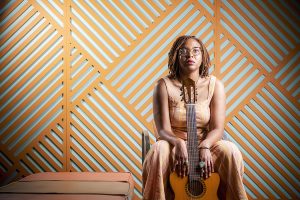Swan Strings received a $4,000 matching grant from the Texas Commission on the Arts, and they have to raise another $4,000 to receive the grant. Help them reach their goal by donating at this link.
Singer/songwriter Jess Garland grew up in Lakewood and lives in the Cedars, but Oak Cliff is the epicenter of her work in music education.
Garland, who plays guitar and harp, taught music at La Rondalla, the free music school based in Oak Cliff, for several years before striking out on her own.
She recently started Swan Strings, a grant-funded program that pays professional musicians to teach free group guitar lessons to children before shop hours and on Sundays at Top Ten Records.
Garland, who has a political science degree from Southern Methodist University, is on the board of Top Ten, and she’s received six grants for music education over the years. In her day job, she works as a community liaison for the Dallas Symphony Orchestra where, among other things, she works with the Young Musicians program, which focuses on providing free music lessons to elementary age children in southern Dallas. That program accepts donations of musical instruments, which can be dropped off at Top Ten.
How did you start playing music?
Both of my grandmas had pianos in their homes. My mom’s mother had an organ. That was my first introduction to music. I started playing the clarinet in elementary school. That was my first instrument. And then I got a guitar in my senior year of high school. I started studying classical guitar at Eastfield College, and I’ve been teaching guitar for 13 years.
How did you get involved with the DSO?
I’d been providing free music lessons in southern Dallas for three years, and the president, Kim Noltemy, heard about me. She has an initiative to reach southern Dallas, and she asked me to put together a group of artists to help. We formed the DSO Southern Dallas Residency Program steering committee.
What has the steering committee done so far?
We had the Erykah Badu concert. That was one of the first things I wanted to do was have Badu perform with the DSO because that’s such a no-brainer for me. We’re really trying to change the demographic of the symphony’s audience.
How is the instrument drive going so far?
Not bad. We got about 12 new instruments. We have instrument fairs so that kids can figure out what instrument they think they want to play.
What else can you tell us about the Young Musicians program?
It’s new. We’re only partnering with Dallas ISD right now. We have three schools in Oak Cliff — Moreno, Webster and Kahn elementary schools — and two schools in Pleasant Grove. We’ve been having instrument fairs, and we have them fill out interest forms. We need 500 students by the end of this fall. I get calls from parents who can’t even believe it’s real.
You recently turned your for-profit business into a nonprofit, Swan Strings. Do you teach your students to read music?
I’m classically trained, but I also come from the avant-garde jazz world. When I was at La Rondalla, we didn’t have music books, so I had to figure out how to teach by ear. Music theory is very important to me, but I’ve relaxed a bit on my teaching style because it’s not for everybody. Not everybody wants to learn how to read music, so I don’t shove that down everybody’s throat. But it’s taught me to use my ear more. Now I have the best of both worlds. Music is a language, and it’s still a language when you’re using your ear. It’s just a different way of using the language.
“Music is therapy”
Why is teaching free music lessons so important to you?
Music is therapy. It’s giving kids something else to do. I’m old school. We didn’t grow up with Instagram and Facebook and cell phones. I went outside and played, and I played instruments and was involved in different activities. Not everybody can afford music lessons. The kids who come to our classes, they really want to be there. They’re there because they want to be there. I have students come from all over, and I have guitars for them to play because even $100 for a guitar is more than some families can afford. And then sometimes they change their mind and want to play something else.
What is your goal for them?
The point is not to get kids to become music professionals. It really is about providing a different outlet for them. And music really helps with other areas of education. It’s sad that you can’t get music in a lot of schools anymore. The consistent message is like, therapy. My students talk to me about all kinds of things. It offers a different form of communication. They can talk about things instead of holding onto them. Growing up around music has such a huge impact on everyone. My 10-year-old cousin is in two music programs, and my 4-year-old niece has a ukulele, and they always want to show me what they can do. It’s exposure and access. They might grow up to be an attorney, but they’ll also grow up to be an arts supporter.
Why is music so therapeutic?
Practicing an instrument is like a spiritual workout. You have to sit and be still. You have to turn off other things and focus. You get to learn a lot about yourself when you’re practicing an instrument. Are you going to keep trying or give up? It’s a discipline.






